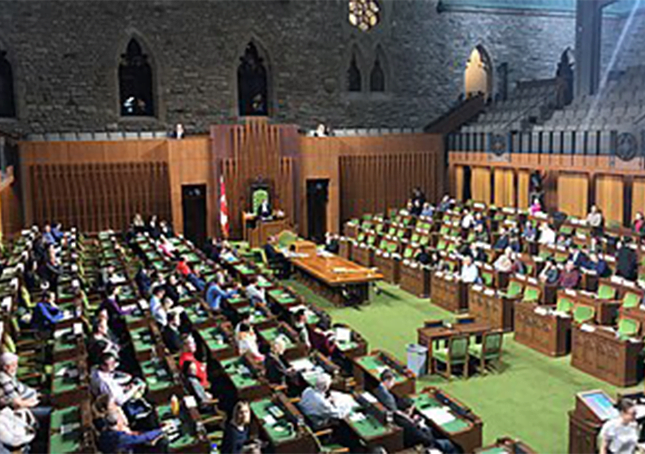House of Commons of Canada

The House of Commons of Canada (French: Chambre des communes du Canada) is the lower chamber of the bicameral Parliament of Canada, which also comprises the sovereign (represented by the governor general as ex officio viceroy) and the Senate of Canada.
The House of Commons currently meets in a temporary Commons chamber in the West Block of the parliament buildings on Parliament Hill in Ottawa, while the Centre Block, which houses the traditional Commons chamber, undergoes a ten-year renovation.
The House of Commons is a democratically elected body whose members are known as members of Parliament (MPs). There have been 338 MPs since the most recent electoral district redistribution for the 2015 federal election, which saw the addition of 30 seats. Members are elected by simple plurality (“first-past-the-post” system) in each of the country’s electoral districts, which are colloquially known as ridings.
MPs may hold office until Parliament is dissolved and serve for constitutionally limited terms of up to five years after an election. Historically however, terms have ended before their expiry and the sitting government has typically dissolved parliament within four years of an election according to a long-standing convention. In any case, an Act of Parliament now limits each term to four years.
Seats in the House of Commons are distributed roughly in proportion to the population of each province and territory. However, some ridings are more populous than others, and the Canadian constitution contains provisions regarding provincial representation. As a result, there is some interprovincial and regional malapportionment relative to the population.
The House of Commons was established in 1867, when the British North America Act 1867 (now called the Constitution Act, 1867) created the Dominion of Canada and was modelled on the British House of Commons. The lower of the two houses making up the parliament, the House of Commons in practice holds far more power than the upper house, the Senate.
Although the approval of both Houses is necessary for legislation to become law, the Senate very rarely rejects bills passed by the Commons (though the Senate does occasionally amend bills). Moreover, the Cabinet is responsible solely to the House of Commons. The prime minister stays in office only so long as they retain the support, or “confidence”, of the lower house.
